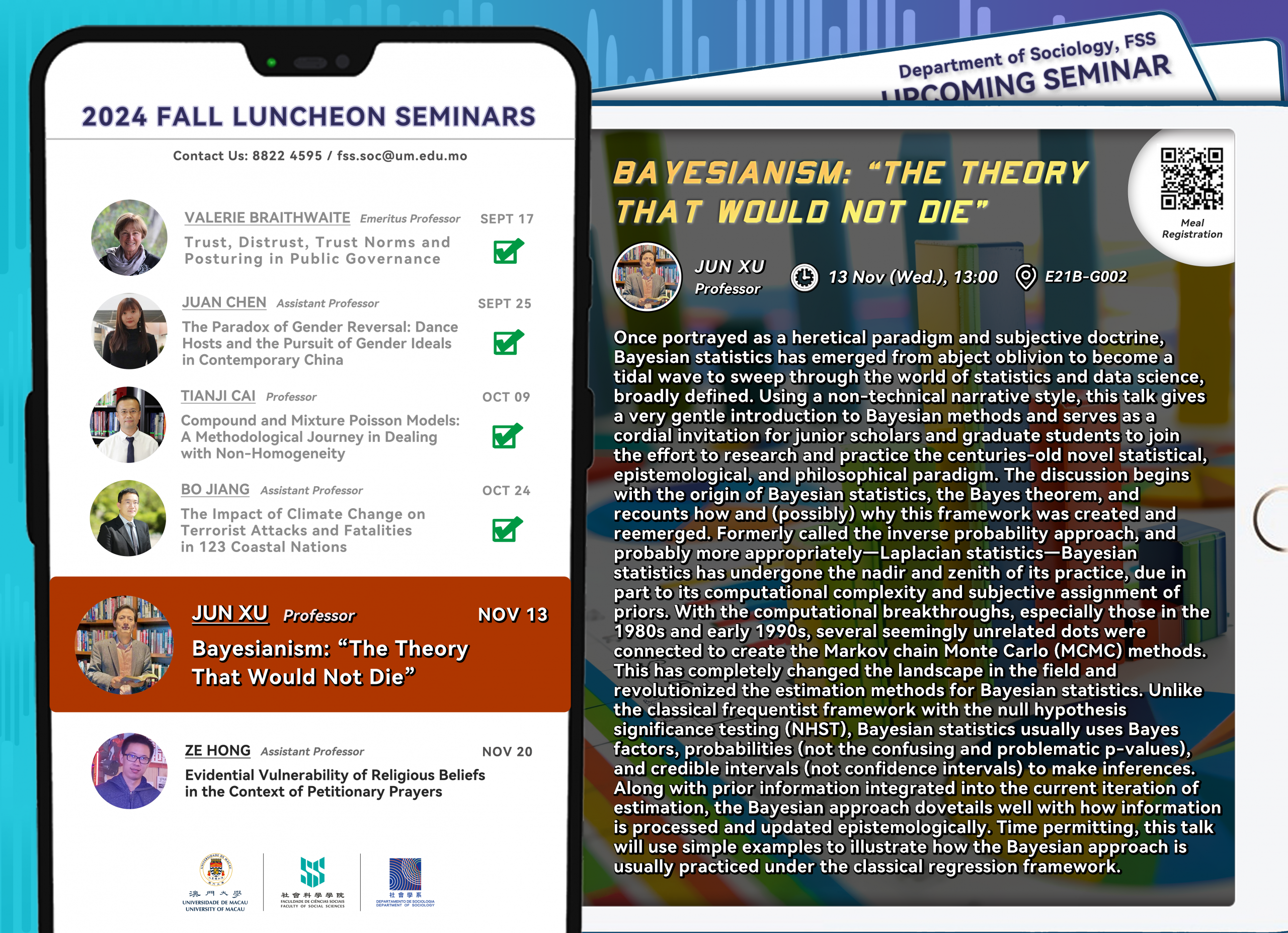
Date: November 13
Time: 1:00 pm – 2:00 pm
Speaker: Prof. Jun XU
Venue: E21B-G002
Organizer: Department of Sociology
Phone: 8822 4595
Once portrayed as a heretical paradigm and subjective doctrine, Bayesian statistics has emerged from abject oblivion to become a tidal wave to sweep through the world of statistics and data science, broadly defined. Using a non-technical narrative style, this talk gives a very gentle introduction to Bayesian methods and serves as a cordial invitation for junior scholars and graduate students to join the effort to research and practice the centuries-old novel statistical, epistemological, and philosophical paradigm. The discussion begins with the origin of Bayesian statistics, the Bayes theorem, and recounts how and (possibly) why this framework was created and reemerged. Formerly called the inverse probability approach, and probably more appropriately—Laplacian statistics—Bayesian statistics has undergone the nadir and zenith of its practice, due in part to its computational complexity and subjective assignment of priors. With the computational breakthroughs, especially those in the 1980s and early 1990s, several seemingly unrelated dots were connected to create the Markov chain Monte Carlo (MCMC) methods. This has completely changed the landscape in the field and revolutionized the estimation methods for Bayesian statistics. Unlike the classical frequentist framework with the null hypothesis significance testing (NHST), Bayesian statistics usually uses Bayes factors, probabilities (not the confusing and problematic p-values), and credible intervals (not confidence intervals) to make inferences. Along with prior information integrated into the current iteration of estimation, the Bayesian approach dovetails well with how information is processed and updated epistemologically. Time permitting, this talk will use simple examples to illustrate how the Bayesian approach is usually practiced under the classical regression framework.
Growing up in the Southeast Coast, receiving undergrad education in the North of China, and dissertating and professing in North America for years, Professor Jun Xu views himself as a geographical and intellectual vagabond with a wide range of scholarly interests. Before joining UM, he taught sociology and data/statistical science courses at Ball State University and through other venues, such as ICPSR and CASER’s Summer School. Professor Xu’s primary research/teaching interests include data and statistical science (computational social science, Bayesian statistics, categorical data analysis, causal inference, machine learning), Asia and Asian America (Asian Americans and China), health and social epidemiology (health disparities, healthcare systems and utilization, and international health), social demography, and welfare systems and political economy. His professional goals are to research to enlighten and to teach to inspire.
Professor Xu regularly collaborates with other scholars in his specialty areas and enjoys working with students on their research projects at both undergraduate and graduate levels. When not at work, Jun loves running, swimming, doing push-ups, tweaking codes, and playing board games. He primarily uses and is still learning R, Stata, and Python for methodological, pedagogical, and substantive projects. His work has appeared in, among others, Comparative Education Review, Social Forces, Social Science & Medicine, Sociological Methods and Research, Social Science Research, and The Stata Journal. He has also published two books–Ordered Regression Models and Modern Applied Regressions–on regression analysis of categorical and limited response variables with Chapman & Hall/CRC.

